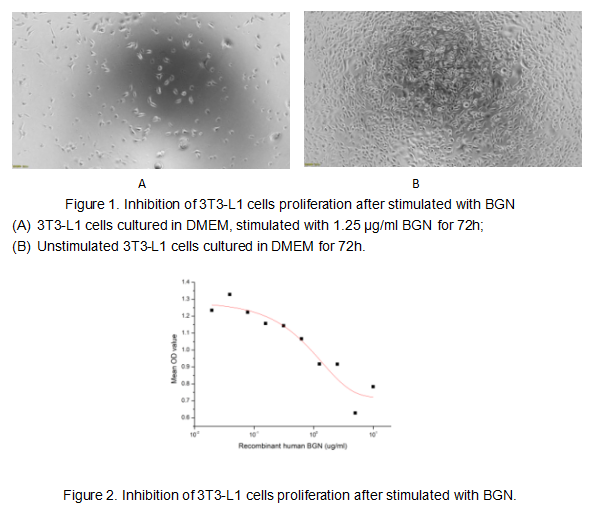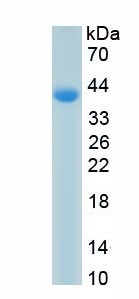Active Biglycan (BGN)
DSPG1; PG-S1; PGI; SLRR1A; Biglycan Proteoglycan; Bone/cartilage proteoglycan I
- Product No.APJ226Hu03
- Organism SpeciesHomo sapiens (Human) Same name, Different species.
- Buffer FormulationPBS, pH7.4, containing 0.01% SKL, 5% Trehalose.
- Traits Freeze-dried powder
- Purity> 90%
- Isoelectric Point8.5
- ApplicationsCell culture; Activity Assays.
- DownloadInstruction Manual
- UOM 10µg50µg 200µg 1mg 5mg
- FOB
US$ 164
US$ 410
US$ 820
US$ 2460
US$ 6150
For more details, please contact local distributors!
ACTIVITY TEST

Biglycan, also known as BGN, is a a small leucine-rich repeat proteoglycan (SLRP). It can be detected in a variety of extracellular matrix tissues, including bone, cartilage and tendon. Biglycan consists of a protein core containing leucine-rich repeat regions and two glycosaminoglycan (GAG) chains consisting of either chondroitin sulfate (CS) or dermatan sulfate (DS). Non-glycanated forms of biglycan (no GAG chains) increase with age in human articular cartilage. Biglycan interacts with collagen, both via the core protein and GAG chains. Biglycan plays a role in the mineralisation of bone. Biglycan core protein binds to the growth factors BMP-4 and influences its bioactivity. To test the effect of BGN on cell apoptosis, 3T3-L1 cells were seeded into triplicate wells of 96-well plates and allowed to attach overnight, then the medium was replaced with various concentrations of recombinant human BGN. After incubated for 72h, cells were observed by inverted microscope and cell proliferation was measured by Cell Counting Kit-8 (CCK-8). Briefly, 10 µl of CCK-8 solution was added to each well of the plate, then the absorbance at 450 nm was measured using a microplate reader after incubating the plate for 1h at 37℃. Proliferation of 3T3-L1 cells after incubation with BGN for 72h observed by inverted microscope was shown in Figure 1. Cell viability was assessed by CCK-8 (Cell Counting Kit-8 ) assay after incubation with recombinant human BGN for 72h. The result was shown in Figure 2. It was obvious that BGN significantly inhibit cell viability of 3T3-L1 cells. The ED50 is 0.89 μg/mL.
USAGE
Reconstitute in 10mM PBS (pH7.4) to a concentration of 0.1-1.0 mg/mL. Do not vortex.
STORAGE
Avoid repeated freeze/thaw cycles. Store at 2-8°C for one month. Aliquot and store at -80°C for 12 months.
STABILITY
The thermal stability is described by the loss rate. The loss rate was determined by accelerated thermal degradation test, that is, incubate the protein at 37°C for 48h, and no obvious degradation and precipitation were observed. The loss rate is less than 5% within the expiration date under appropriate storage condition.
GIVEAWAYS
INCREMENT SERVICES
-
 BCA Protein Quantification Kit
BCA Protein Quantification Kit
-
 Molecular Mass Marker for Protein
Molecular Mass Marker for Protein
-
 Monoclonal Antibody Customized Service
Monoclonal Antibody Customized Service
-
 Polyclonal Antibody Customized Service
Polyclonal Antibody Customized Service
-
 Protein Activity Test Experiment Service
Protein Activity Test Experiment Service
-
 Electrophoretic Mobility Shift Assay (EMSA) Experiment Service
Electrophoretic Mobility Shift Assay (EMSA) Experiment Service
-
 Buffer
Buffer
-
 Lentivirus Packaging Experiment Service
Lentivirus Packaging Experiment Service
-
 Adenovirus Packaging Experiment Service
Adenovirus Packaging Experiment Service
-
 Real Time PCR Experimental Service
Real Time PCR Experimental Service
-
 Spike RBD Protein (S-RBD)
Spike RBD Protein (S-RBD)
-
 Protein G
Protein G
-
 Protein A
Protein A
| Magazine | Citations |
| Sci Rep. | Tumour endothelial cells in high metastatic tumours promote metastasis via epigenetic dysreCavia (Guinea pig )lation of biglycan Pubmed:27295191 |
| Cell Death & Disease | Tenomodulin is essential for prevention of adipocyte accumulation and fibrovascular scar formation during early tendon healing. pubmed:29022912 |
| Diabetes & Vascular Disease Research | Degenerative aortic valve disease and diabetes: Implications for a link between proteoglycans and diabetic disorders in the aortic valve Pubmed: 30563371 |
| 博士论文 | Die Rolle der extrazellulären Matrix in der degenerativen Aortenklappenerkrankung unter dem Einfluss von Diabetes |
| J Transl Med | Multi-omic signatures of atherogenic dyslipidaemia: pre-clinical target identification and validation in humans 33407555 |
| researchsquare | Inhibition of Stromal Biglycan Promotes Normalization of the Tumor Microenvironment and Enhances Chemotherapeutic Efficacy 33966638 |
| Catalog No. | Related products for research use of Homo sapiens (Human) Organism species | Applications (RESEARCH USE ONLY!) |
| RPJ226Hu01 | Recombinant Biglycan (BGN) | Positive Control; Immunogen; SDS-PAGE; WB. |
| APJ226Hu03 | Active Biglycan (BGN) | Cell culture; Activity Assays. |
| RPJ226Hu03 | Recombinant Biglycan (BGN) | Positive Control; Immunogen; SDS-PAGE; WB. |
| RPJ226Hu02 | Recombinant Biglycan (BGN) | Positive Control; Immunogen; SDS-PAGE; WB. |
| PAJ226Hu01 | Polyclonal Antibody to Biglycan (BGN) | WB; IHC; ICC; IP. |
| PAJ226Hu02 | Polyclonal Antibody to Biglycan (BGN) | WB; IHC; ICC; IP. |
| LAJ226Hu71 | Biotin-Linked Polyclonal Antibody to Biglycan (BGN) | WB; IHC; ICC. |
| SEJ226Hu | ELISA Kit for Biglycan (BGN) | Enzyme-linked immunosorbent assay for Antigen Detection. |
| LMJ226Hu | Multiplex Assay Kit for Biglycan (BGN) ,etc. by FLIA (Flow Luminescence Immunoassay) | FLIA Kit for Antigen Detection. |







